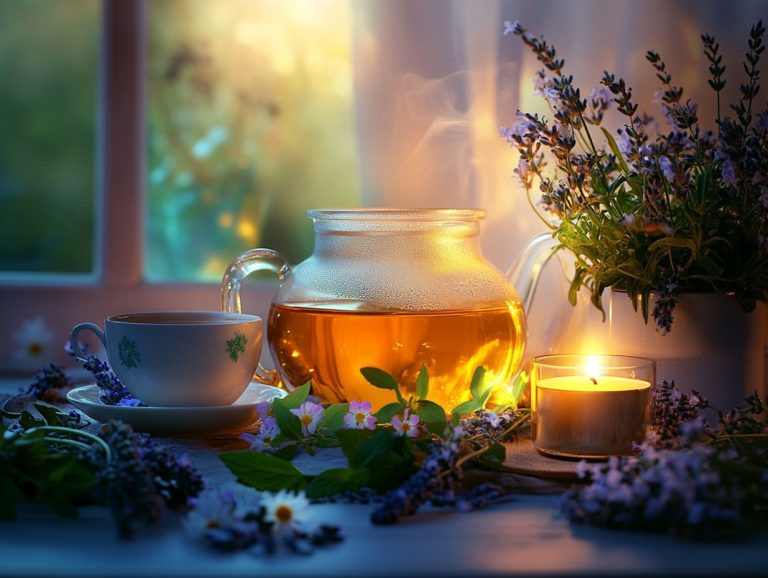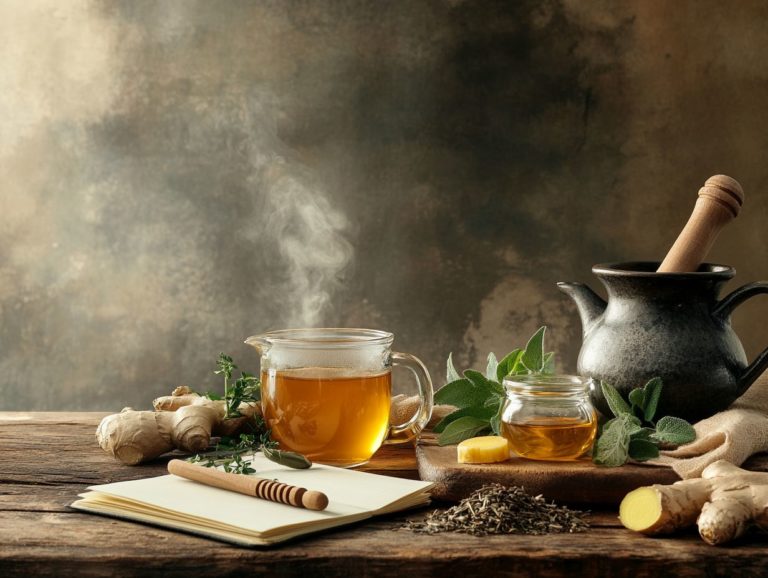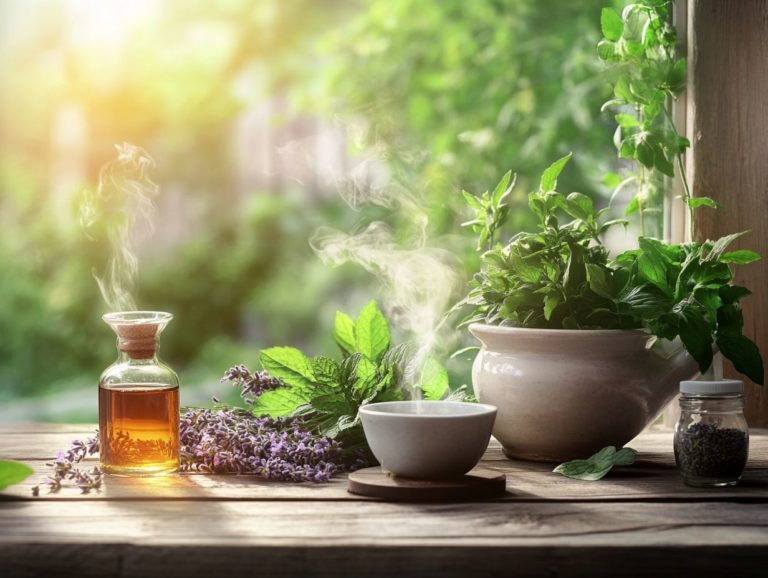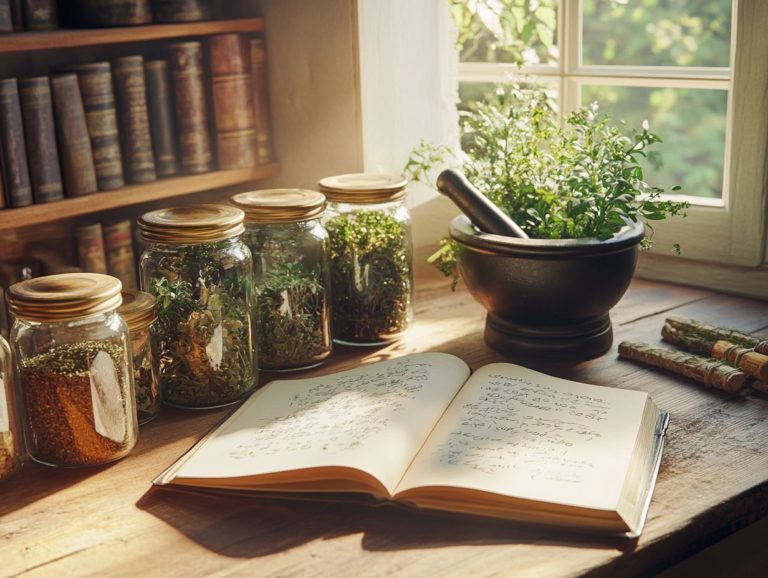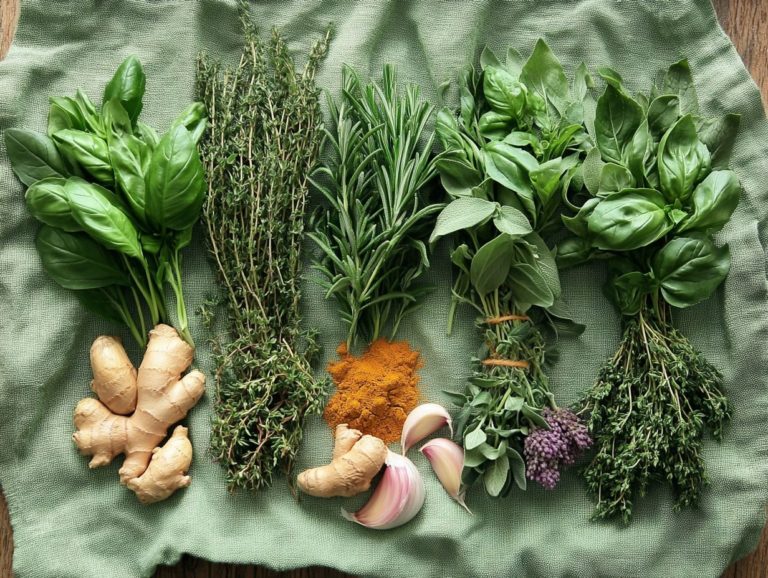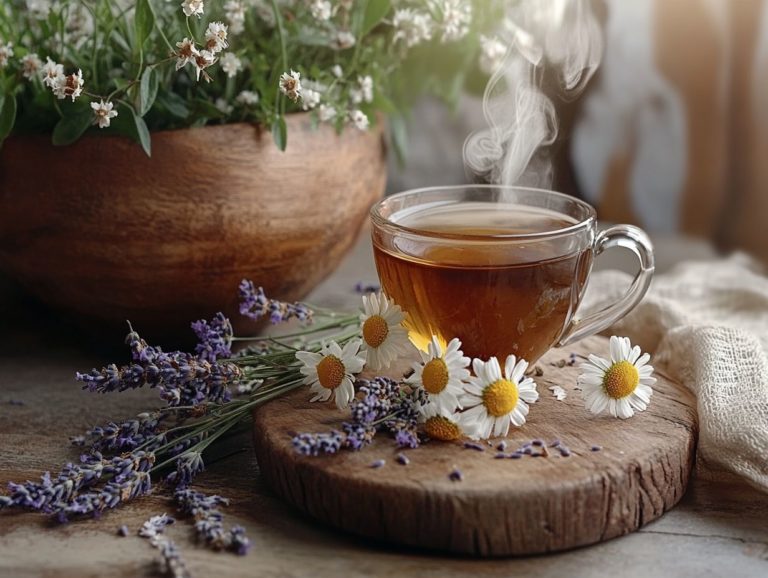5 Must-Have Herbs for Herbalists
Herbalism has captivated individuals for centuries, presenting a natural pathway to wellness through the remarkable power of plants.
In this guide, you will discover five essential herbs every herbalist should have in their arsenal:
- Lavender
- Echinacea
- Chamomile
- Ginger
- Peppermint
Each of these herbs possesses unique properties that can significantly enhance your health and well-being.
You ll learn how these herbs function, their many benefits, potential side effects, and practical methods to seamlessly incorporate them into your daily routine.
Whether you are a seasoned herbalist or just beginning your journey, this guide will empower you to harness the healing potential of these extraordinary plants.
Contents
- Key Takeaways:
- 1. Lavender
- 2. Echinacea
- 3. Chamomile
- 4. Ginger
- 5. Peppermint
- What Is Herbalism and How Does It Work?
- Your Top Herbal Queries Answered!
- 1. What are the 5 must-have herbs for herbalists?
- 2. Why is ginger considered a must-have herb for herbalists?
- 3. Can garlic be used for more than just cooking?
- 4. How is echinacea used in herbal medicine?
- 5. What are the benefits of including chamomile in an herbalist’s toolkit?
- 6. How can peppermint be used as a medicinal herb?
Key Takeaways:
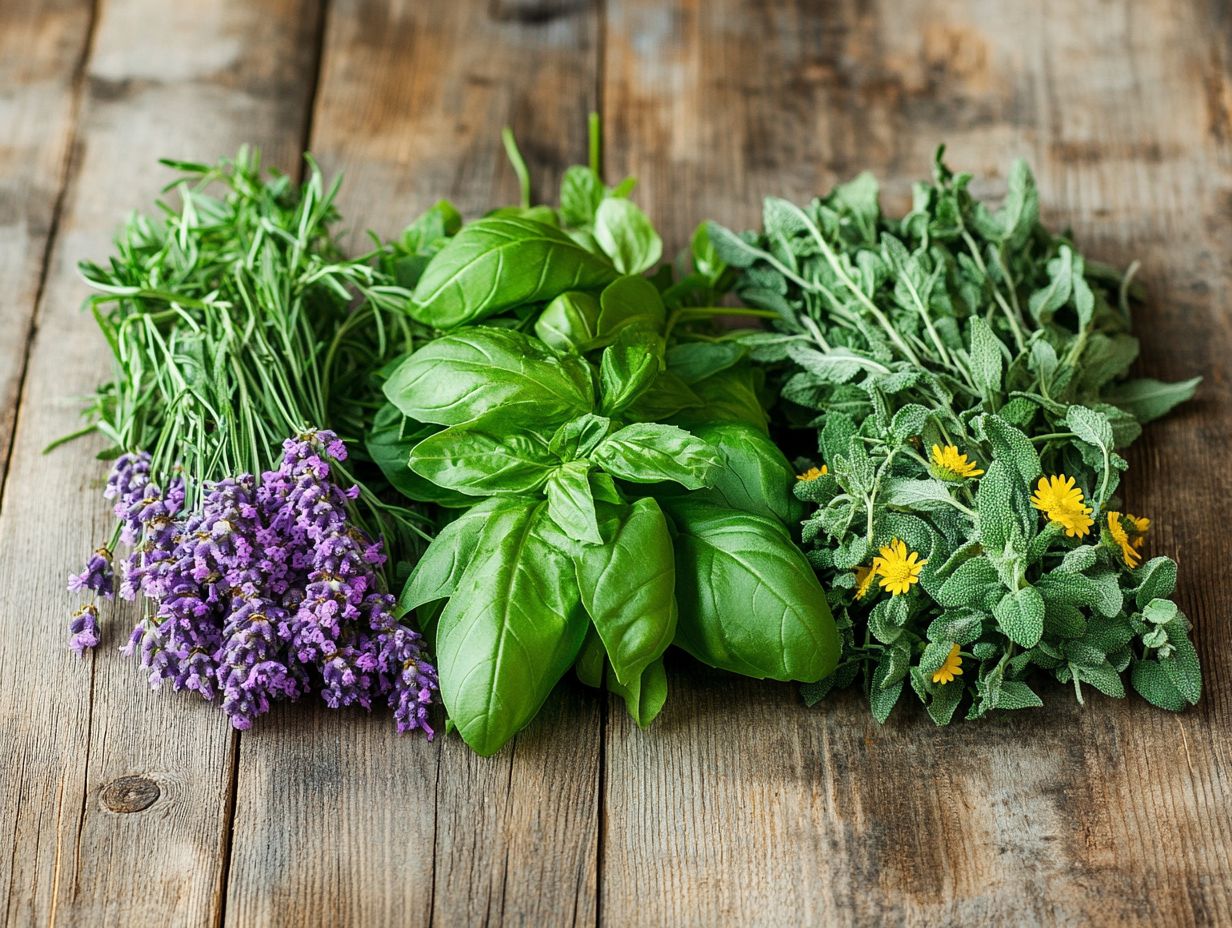
Don t miss out on these essential herbs that can transform your health!
Lavender is a versatile herb for herbalists, offering benefits for relaxation, pain relief, and skin health.
Echinacea is a powerful herb for boosting the immune system and treating infections and inflammation.
Chamomile is a gentle but effective herb for calming nerves, promoting sleep, and relieving digestive issues.
1. Lavender
Lavender is not just a garden beauty; it s a powerful wellness ally! With its enchanting purple blooms and captivating fragrance, it adds elegance to your landscape while offering a wealth of culinary uses and medicinal benefits.
Its versatility makes it a beloved choice for herb gardening enthusiasts, especially those looking to cultivate a fresh kitchen garden.
In the culinary world, lavender brings a distinctive flavor that enhances both sweet and savory dishes, from cookies and cakes to roasted meats. Its soothing properties are renowned for promoting stress relief and improving sleep quality, leading to an increased interest in lavender-infused herbal remedies.
By incorporating dried lavender into your herbal teas, you can create a calming beverage that s just right for unwinding after a long day.
Thinking of growing lavender? It s easier than you think! It thrives in well-drained soil and adores full sun, making it a low-maintenance gem in any garden. Regular pruning encourages bushier growth and boosts blooming, ensuring you can enjoy this aromatic herb throughout the year.
2. Echinacea
Echinacea, a celebrated medicinal herb, is renowned for its immune-boosting properties and its remarkable ability to combat colds and infections. It’s become a staple in many herbal remedy formulations.
This versatile herb is available in many forms, including capsules, liquid extracts, and teas, allowing you to choose what suits your preferences and needs.
Many turn to herbal supplements featuring Echinacea to enhance overall wellness and seek natural relief during the cold and flu season.
If you have a green thumb, growing Echinacea at home can be a rewarding endeavor. It flourishes in well-drained soil and full sunlight, making it an ideal addition to your garden.
Just keep an eye out for potential pests like aphids and spider mites that could impede growth. With proper care and maintenance, you can cultivate a healthy crop rich in medicinal value.
3. Chamomile
Chamomile, that wonderfully soothing herb often found in herbal tea, is celebrated for its calming effects and an array of health benefits, such as aiding digestion and promoting restful sleep. This makes it a critical addition to herbal remedies and any home kitchen garden focused on wellness.
Beyond its therapeutic virtues, cultivating chamomile can be a truly rewarding experience, whether you re nurturing it in a cozy container garden or within a more expansive traditional plot.
Growing this delightful plant is remarkably simple; it flourishes in well-drained soil and prefers a sunny spot. Regular watering while steering clear of over-saturation will ensure its robust growth.
Once those delicate, daisy-like flowers bloom, you can harvest them for their aromatic qualities. They re perfect for infusing in warm water or incorporating into a variety of culinary delights. With its light, apple-like flavor, chamomile elevates both sweet and savory dishes, adding an enchanting touch to your home cooking.
4. Ginger
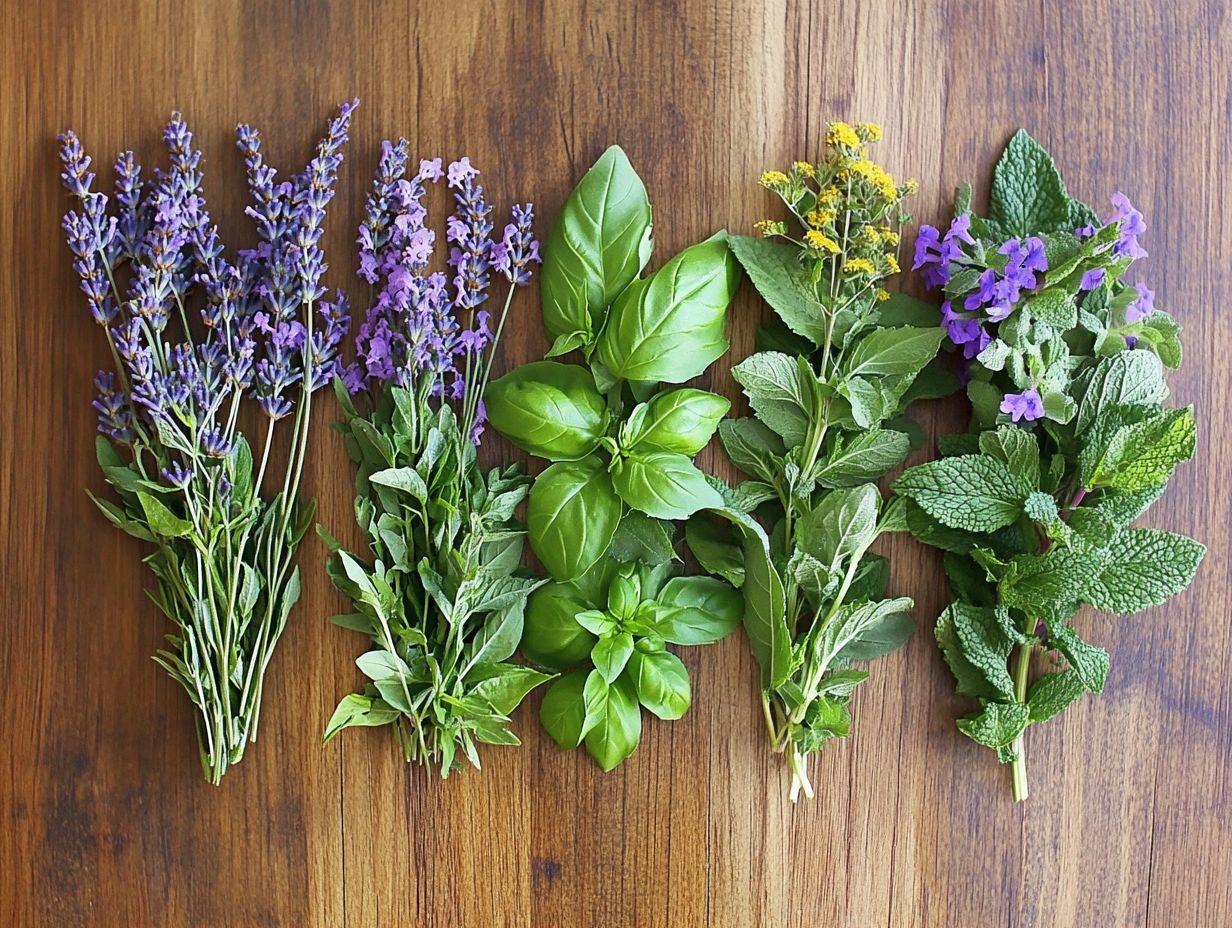
Ginger is a favorite spice that s loved for its unique flavor and incredible health benefits! It is celebrated for its anti-inflammatory and digestive properties, making it an essential ingredient in both culinary creations and herbal remedies.
This spice shines across various cuisines, elevating the taste of countless dishes. From savory stir-fries to delightful desserts, this vibrant root enhances flavor profiles, infusing warmth and delicious zest into your meals.
Beyond its culinary charm, ginger also acts as a natural remedy, providing relief from nausea and boosting your immune system.
If you’re intrigued by the idea of cultivating ginger at home, start growing it today! You’ll enjoy the fresh flavor and health perks right from your garden. Ginger thrives in well-drained, warm soil with partial sunlight. Regular watering and a humid environment are crucial for its optimal growth.
Whether you choose to grow it indoors or in your garden, maintaining these conditions will lead to a bountiful harvest of this aromatic herb, enriching both your dishes and your health.
5. Peppermint
Peppermint, with its invigorating aroma and flavor, is not just a culinary favorite; it also boasts impressive health benefits, from aiding digestion to relieving headaches. This makes it a critical herb in any kitchen garden or herbal tea collection.
Whether you re brewing peppermint tea or crafting infused cocktails, its lively flavor elevates a variety of beverages. In desserts, it brings a delightful twist to brownies, ice creams, and even mousses, transforming the ordinary into the extraordinary.
In the realm of herbal remedies, peppermint serves as a versatile ally, often used to alleviate nausea and provide respiratory relief.
If you’re considering growing peppermint at home, you’ll find it flourishes in rich, moist soil with partial shade. Keep in mind that it requires regular watering but be mindful of drainage to prevent oversaturation.
To maintain the health of your plants, staying vigilant for pests like aphids and spider mites is essential. You can harvest the leaves throughout the growing season, ensuring a steady supply of this aromatic herb while encouraging bushier growth.
What Is Herbalism and How Does It Work?
Herbalism is a holistic practice that harnesses the remarkable power of medicinal herbs to promote your health and wellness. By utilizing the natural compounds found within plants, you can create effective herbal remedies and supplements tailored specifically to your individual needs.
This ancient practice is becoming popular again as people seek natural health solutions. Herbs such as basil, thyme, and ginger are important for a healthy lifestyle.
With roots tracing back to ancient civilizations, herbalism weaves a rich tapestry of knowledge that transcends cultures and time. Today, it seamlessly intersects with contemporary health practices, offering a valuable complement to conventional medicine.
You ll find various forms of herbal supplements available to suit your preferences, including:
- Teas
- Capsules
- Tinctures (liquid extracts of herbs)
- Powders
These herbs are extracted using methods like steam distillation, cold pressing, or alcohol extraction. Integrating them into your daily routine can be as simple as cooking with them, brewing a soothing tea, or taking supplements. Enjoy a plethora of health benefits, from anti-inflammatory effects to immune support.
However, it’s essential to remain mindful of potential side effects and interactions, as some herbs may not be suitable for everyone. This underscores the importance of informed and responsible use in your wellness journey.
Have you tried using herbal remedies in your life?
What Are the Benefits of Using Herbs for Healing?
The benefits of using herbs for healing are truly remarkable. They offer a plethora of health advantages such as improved digestion, enhanced immunity, and stress relief.
This establishes medicinal herbs as a critical element in both traditional and modern herbal remedies for cooking and health.
By incorporating herbs like peppermint and ginger into your daily meals, you can promote better digestion. Meanwhile, echinacea and elderberry work wonders in bolstering your body’s natural defenses during cold and flu season.
Herbal teas, such as chamomile and lemon balm, calm the mind and aid in relaxation. Imagine the wonders of digesting meals with ease!
From a nutritional perspective, herbs are packed with essential vitamins and minerals that contribute to your overall well-being. Scientific studies consistently back these benefits, showing that regular consumption of specific herbs can lead to improved health outcomes.
Don t wait! Start incorporating these herbs into your life today for better health.
How Can These Herbs Be Used for Medicinal Purposes?
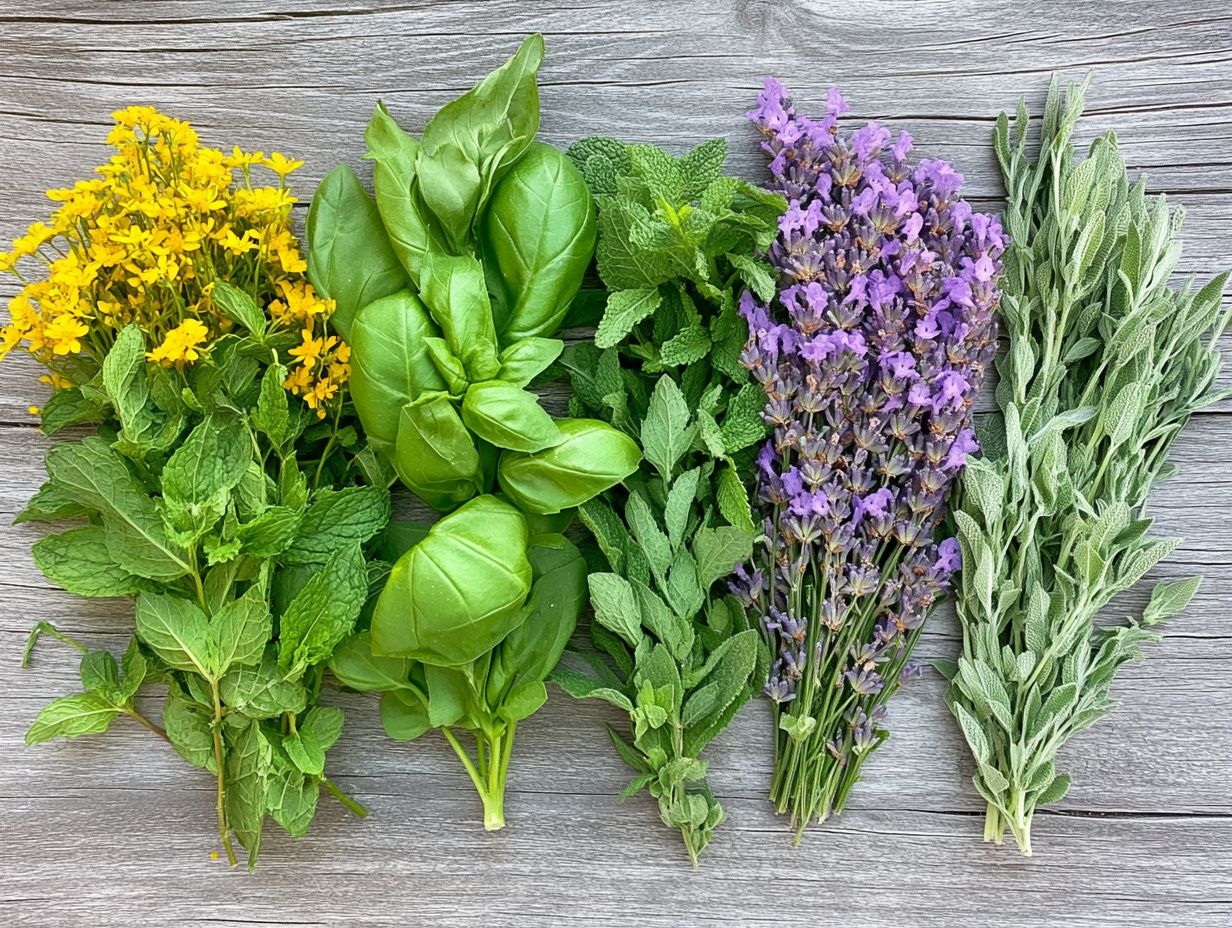
Medicinal herbs present a versatile toolkit for enhancing your health and well-being. They are available in various forms such as teas, liquid extracts made from herbs, capsules, and culinary applications.
Take herbal teas, for instance; chamomile is celebrated for its calming effects. It often serves as a gentle ally in alleviating anxiety and promoting restful sleep.
Liquid extracts made from herbs, like those crafted from echinacea, offer a potent means of bolstering your immune system and warding off pesky colds.
Capsules provide a hassle-free way to integrate powerful herbs like turmeric into your daily routine, thanks to its renowned ability to help reduce inflammation or swelling.
And let s not overlook cooking with herbs such as rosemary, which not only elevates your dishes but also delivers antioxidants that can enhance your overall health.
With each method offering its unique advantages, you have the freedom to customize your approach based on your personal preferences and health aspirations.
What Are the Possible Side Effects of These Herbs?
While medicinal herbs boast a wealth of health benefits, it’s crucial to be mindful of potential side effects that may accompany their use. These can include allergic reactions or interactions with other medications. That’s why understanding herbalism is important.
Many people might not realize that even popular herbs like echinacea and ginseng can provoke unexpected reactions, especially when combined with prescription medications or other herbal supplements.
Before you introduce any new herb into your routine, it’s wise to consult with healthcare professionals who can offer insights tailored to your individual health conditions and medication regimens.
Taking a gradual approach to incorporating these herbs allows you to monitor any adverse effects more easily. This careful approach boosts safety and maximizes the health benefits of these remedies.
How Can One Incorporate These Herbs into Their Daily Routine?
Incorporating herbs into your daily routine can be elegantly achieved through various methods. You might consider adding fresh herbs to your meals, brewing a soothing herbal tea, or even exploring herbal supplements.
Each of these options enhances flavor and provides notable health benefits. Understanding which herbs complement specific dishes can transform ordinary recipes into something extraordinary.
- A sprinkle of basil can elevate a simple pasta dish.
- While a dash of rosemary adds remarkable depth to roasted vegetables.
If you re keen on maximizing the medicinal benefits, explore herbal infusions or tinctures, offering concentrated sources of nutrients and therapeutic properties.
Creating a small herb garden at home can provide you with a regular supply while granting the satisfaction of nurturing your own ingredients.
Herbs like mint, cilantro, and thyme are particularly easy to cultivate. They require minimal space and care, making them ideal additions to any kitchen.
What Are the Different Forms of Herbal Supplements Available?
Herbal supplements come in various forms, such as capsules, powders, extracts, and teas. Each offers unique ways to harness the health benefits of medicinal herbs.
Capsules are a convenient option, favored for their ease of use and precise dosage. They re ideal for those with busy lifestyles. Powders offer flexibility in dosing but may require mixing with liquids, which can be challenging for some.
Herbal extracts are often found as tinctures, delivering concentrated benefits that are easily absorbed. However, their strong flavors might not appeal to everyone. Teas provide a soothing ritual, allowing you to enjoy the brewing process while gradually reaping benefits over time.
Popular choices include:
- Turmeric: known for inflammation relief
- Echinacea: supports the immune system
- Ashwagandha: helps reduce stress
Each form has its advantages and potential drawbacks. Ultimately, the choice depends on your personal preferences and health goals.
Your Top Herbal Queries Answered!
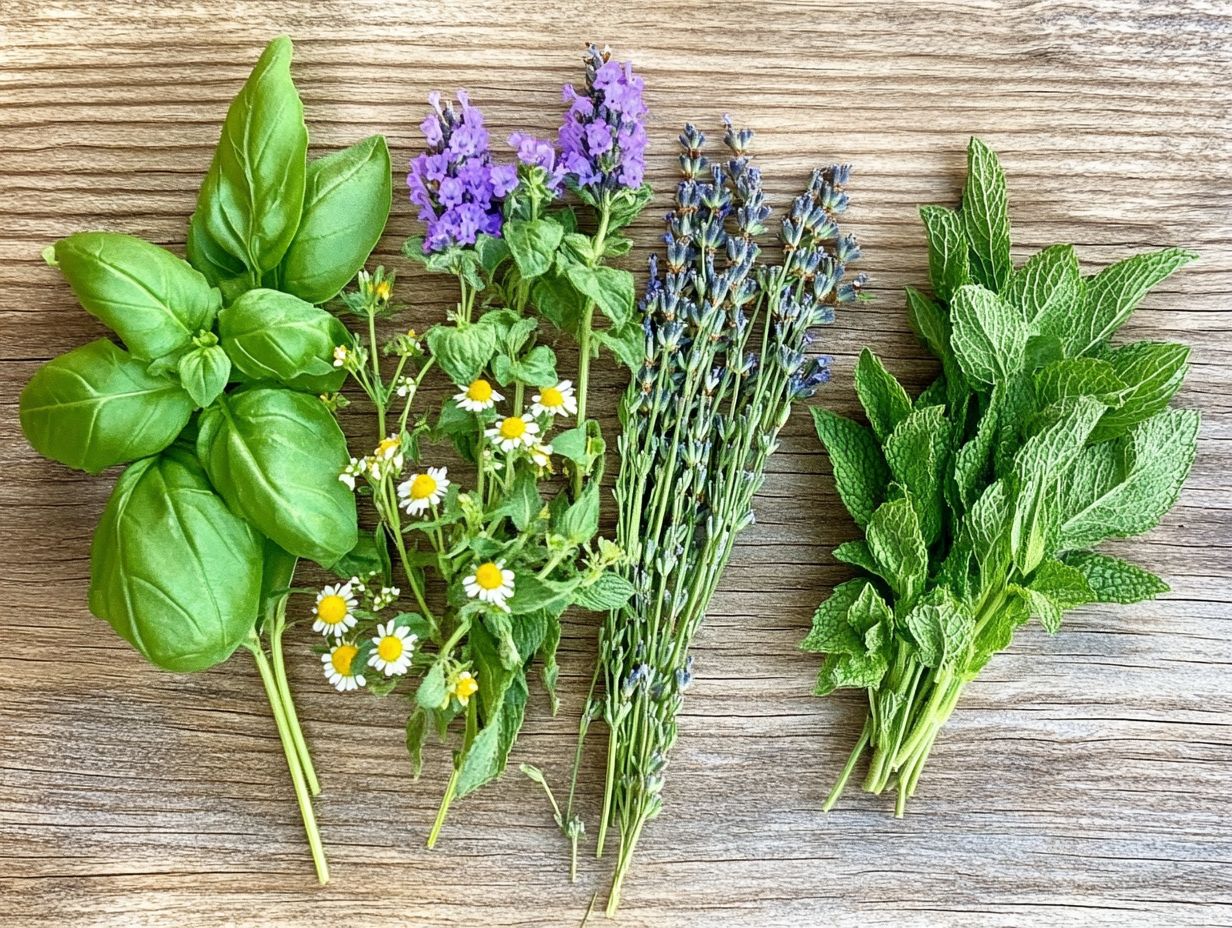
1. What are the 5 must-have herbs for herbalists?
The five must-have herbs for herbalists are ginger, garlic, echinacea, chamomile, and peppermint.
2. Why is ginger considered a must-have herb for herbalists?
Ginger is essential for herbalists due to its anti-inflammatory properties. It also aids digestion and can help with nausea.
3. Can garlic be used for more than just cooking?
Yes! Garlic is not only a cooking staple but also a powerful medicinal herb that boosts the immune system and fights infections.
4. How is echinacea used in herbal medicine?
Echinacea is widely used to enhance the immune system and combat colds and infections. It can be taken as a supplement or brewed into a tea.
5. What are the benefits of including chamomile in an herbalist’s toolkit?
Chamomile is renowned for its calming properties, making it a fantastic herb for stress and anxiety. It also soothes digestive issues and promotes sleep.
6. How can peppermint be used as a medicinal herb?
Peppermint boasts numerous uses in herbal medicine, such as relieving headaches, aiding digestion, and reducing nausea. It can be consumed as tea, added to food, or applied topically as an essential oil.

